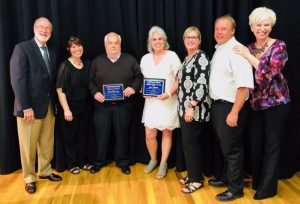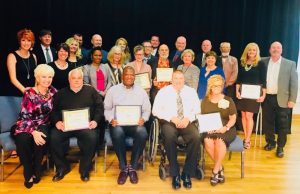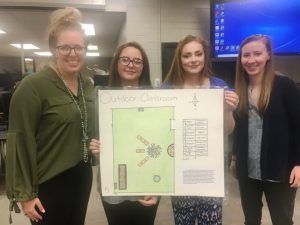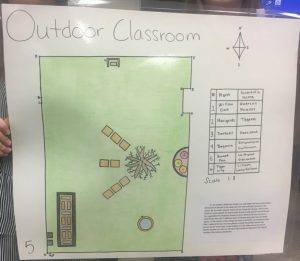News
Chamber Shines at Annual Banquet
May 1, 2019
By:
Members of the community joined the Chamber of Commerce in celebrating 56 years of service to Smithville and DeKalb County during the annual banquet held Tuesday night at the county complex.
A recap of community achievements and presentation of Chamber Milestone awards and Leadership DeKalb Alumni Association honors were among the highlights of the program.
Lisa Cripps, Coordinator of the DeKalb Prevention Coalition, received the Community Leader of the Year Award and the Legacy Award went to WJLE’s Dwayne Page. The awards were presented by Leadership DeKalb representatives Jen Sherwood and Beth and Darrell Gill.
The Community Leader of the Year is awarded to the individual who most emulates the definition of community trustee and servant-leader in his or her recent service to DeKalb County. Nominees are considered who have made a significant and positive impact on our county specifically in 2018 and in a capacity beyond their professional role.
The 2018 Community Leader of the Year is Lisa Cripps.
She is a 1976 graduate of DCHS and graduated from MTSU in 1980 and began teaching at DeKalb West School that same year. Lisa earned her Masters degree in Education in 1994 and became assistant principal at Smithville Elementary School in 1995. She moved to DeKalb Middle School in 2000 to teach 8th grade science and became Supervisor of Instruction in 2011. She was named Regional Teacher of the Year in 2008. Lisa retired from the school system in 2017 after 33 years of service and is now the coordinator of the DeKalb Prevention Coalition.
“Since taking over the DeKalb Prevention Coalition two years ago she has brought this organizations engagement in the community to new heights. She works tirelessly in bringing awareness, education, and solutions to our communities on every drug related issue for both addiction and prevention. In her own words Lisa said It is our responsibility to find a vital part of the community to touch lives. We are supposed to be used by God,” said Darrell Gill in presenting this award.
The Legacy Leader Award is awarded to someone who most emulates the definition of community trustee and servant-leader in his or her continued service to DeKalb County. The winner has made a significant and positive impact on our county over a considerable period of time and in multiple and lasting ways. This year’s award was presented to Dwayne Page.
“Dwayne started at WJLE in 1979 as a staff announcer after graduating high school. He attended broadcasting school in Nashville but attributes much of his learning to his mentor former WJLE manager Ralph Vaughn, who hired him. Dwayne quickly picked up increasing responsibilities such as covering local news and contributing to the business aspects of the radio station. He became station and sales manager in 1992. Dwayne says he prefers to turn the spotlight on others instead of himself. He says he likes to report the news, not make the news. But tonight we have the honor of doing just that. We recognize Dwayne Page for inspiring us to be a community of more good news than bad. Tonight, we honor your amazing lifelong example of dedication to your profession and your community. Tonight we get to say thank you for holding the fabric of our community together with your commitment of who we are as a community. You are a community treasure. Thank you for your many contributions to DeKalb County,” said Jen Sherwood in presenting the award.
Ralph Vaughn also presented to WJLE a Chamber Milestone Award for 55 years of service to the community and to Page for his 40 years at the radio station.
Other Chamber Milestone Awards were presented to the following:
*Phillip Cantrell of Cantrell’s the home of Fluty and Fluty’s Shoes for 55 years in business
*Ascension Saint Thomas DeKalb Hospital-50 years
*Appalachian Center for Crafts-40 years
*DRiV (AKA Federal-Mogul Motorparts)-40 years
*Tom Janney of Janney & Associates, CPA’s-30 years
*Robin and Kristie Driver of Center Hill Realty-30 years
*DeKalb County Volunteer Fair Board-25 years
*Evins Mill-25 years
*DeKalb Funeral Chapel-20 years
*JBeez Watercraft-20 years
*Off the Beaten Path Studio Tour-20 years
Chamber Executive Director Suzanne Williams recapped highlights from the past year including completion of façade improvements made to several downtown building store fronts thanks to a $100,000 Community Development Block Grant. She presented a brief power point which showed before and after photos of the buildings. Williams also spoke of the Chamber ‘s success in securing a Tennessee Department of Tourist Development Grant for a Smithville Fiddlers’ Jamboree billboard on I-40. She also touted local growth in tourism. Last year the state announced that DeKalb County’s tourism dollars increased by 6.7% from the previous year to $48.02 million, the third highest tourism dollars in the 14-county Upper Cumberland region.
The 2019 Chamber Executive Officers are as follows: Beth Adcock, Smithville Police Department, Chamber President. Lisa Cripps, DeKalb Prevention Coalition, Vice-President. Jane Brown, Middle TN Natural Gas, Secretary. Kathy Hendrixson, Director of the DeKalb County Library Systems, Treasurer. Rita Bell, Haven of Hope, Past President.
New Board Members include Billie Davis, JBeez Watercraft/Canoe the Caney, Jen Sherwood, Federal Mogul; Norene Puckett, DeKalb Recovery Court; Leigh Fuson, DeKalb Extension/4-H; Josh Issac, DeKalb County Complex; and Kathy Hendrixson, DeKalb Library Systems.
Other Chamber Board Members include Dana Scott, Tenneco; Mark Taylor, Edgar Evins State Park; Lora Webb, The Webb House; Debra Ruzinsky, Appalachian Center for Craft; Tom Sturdivant, Pates Ford Marina/Fish Lipz Grill & Sligo Marina/Restaurant; and Andy Wachtel. Honorary Board Members are DeKalb County Mayor Tim Stribling, Smithville Mayor Josh Miller, Alexandria Mayor Bennett Armstrong, Dowelltown Mayor Pam Redmon, and Liberty Mayor Dwight Mathis.
The 2018 Officers were Rita Bell, President; Beth Adcock, Vice-President; Jane Brown, Secretary; Sherry Harris, Treasurer; and Isaac Gray, Past President. Retiring Board Members include Isaac Gray, Smithville Cumberland Presbyterian Church; Steve Johnson, DTC Communications; Connie Tjarks, DeKalb Farmers Market, and Sherry Harris, D&S Special-tees.
The Chamber banquet opened with welcoming remarks by Chamber President Beth Adcock and County Mayor Tim Stribling, a presentation of the flags and the pledge of allegiance by Boy Scout Troop #347, and the National Anthem by Josh Isaac. Keyboardist Susan Hinton performed dinner music.
DCHS Students Design New Outdoor Learning Space and Garden to be Developed on Campus (VIEW VIDEO HERE)
April 30, 2019
By: Dwayne Page
DeKalb County High School will soon have a beautiful Outdoor Learning Space and Garden thanks to a grant and the creativity of students in the agriculture program’s landscape design class who came up with the layout.
When finished the venue will serve as an outdoor collaborative work area for students in a variety of classes complete with picnic tables, raised beds for growing herbs and vegetable plants, a flower bed, bench, bird bath, storage sheds, and more.
Development of the area, approximately 200’ x 250’ in size, is expected to begin by May 16, which is the date for the annual DCHS Beautification effort.
Funding for the Outdoor Learning Space and Garden was made possible through a $5,000 grant from the Lowe’s Toolbox for Education Foundation.
“Last fall Supervisor of Instruction Dr. Kathy Bryant, Agriculture Teacher and FFA Advisor Lizzie Burrows, and I got together and decided to write a grant for the project through this Foundation. Our goals were to provide some continuous improvement of our campus in a way that students could take some responsibility for and really be proud of. We also wanted a space that provided a collaborative work area for our students. A lot of our teachers like to take their students outside when the weather is nice and that has a lot of benefits but there isn’t really a central location for us to be able to do that. We have this courtyard on campus that isn’t being used so we thought that was kind of the perfect location so we wrote the grant and it was awarded in January. After that Ms. Burrows made plans for her class to develop a design for the space,” said DCHS Math Teacher Amy Fricks.
As a way of giving students more ownership of the project, Ms Burrows said she decided to have a contest among the students in her landscape design class to come up with an idea for the layout of the garden. Members of the student body and teachers were given the opportunity to vote for the top two designs. Those were submitted to a selection committee which met Tuesday morning and chose the design by students Aubry Downey and Allison Young which will be used as the model for the garden.
“The timing lined up perfectly. We were awarded the grant right as my landscape design class was starting so they were able to do this work in class and really be invested in the project. As we worked through the semester and they learned more about landscape designing we decided that it would be great to make a contest out of this to give the students some ownership and some pride in being able to tell their friends and family that they designed the outdoor classroom at DCHS. They partnered up in small groups and began working on landscape designs for about four weeks. They created their final draft including a plant list with all the plants they wanted to include, where the planters and benches were going to go, down to where the water hookups and the storage space was going to be. From there we took those designs and displayed them outside the library for four days and announced that people could go online to vote for their top two designs. We opened it up to students and teachers and we had over 200 votes submitted for our top two designs and those designers pitched their creation to a committee who talked about what would be best for the space and we chose a winner from there,” said Ms. Burrows.
In their presentation to the selection committee, Downey and Young wrote that “In our outdoor classroom design you will notice we have picnic tables fanned out to the left of the large oak tree that’s already growing in the space. By the water spicket, there are two sheds for storage. Next to the sheds we have placed 10 raised beds fenced in with gravel that will house the vegetables the students choose to grow. Behind the tree we have a small flower bed with 3 different types of flowers (Marigolds, Daffodils, and Begonias). At the bottom of the design we have a bird bath surrounded by Tiger Lilies. Lastly at the top we have placed a small memorable bench that serves as our focal point. It has trellises on both sides and at the top for flowers (sweet peas) to grow on and we will have each student’s fingerprint that helped construct the outdoor classroom”.
“I have been really impressed with how creative the students were in coming up with the design for the space. The things we knew we wanted in there we went ahead and wrote into the grant such as picnic tables and seating for a full class of 35 students but the students came up with other ideas they wanted to add,” said Ms. Fricks.
“We’re hoping that this courtyard will be a collaborative space. We plan to work with the Middle School in maintaining some of those raised beds and we are also planning on planting herbs and vegetables out there that our culinary students can utilize in their classes,” added Ms. Burrows.
“We are really excited to finally see that courtyard being used for something. That space will offer a lot of potential and opportunity for collaboration among classes in providing a good learning space for our kids,” said Ms Fricks.
Smithville Elementary Names Students of the Month for April
April 30, 2019
By: Dwayne Page
Smithville Elementary would like to recognize the Students of the Month for April. These students were selected for their outstanding character, academics, and other traits that make them an all-around excellent student. Selected as Students of the Month for April are: PreK – Braylen Gutierrez; K – Liam Turner; 1st – Valerie Khadzi; and 2nd – Nate Wilson
« First ‹ Previous 1 1830 1920 1928 1929 19301931 1932 1940 2030 2503 Next › Last »













